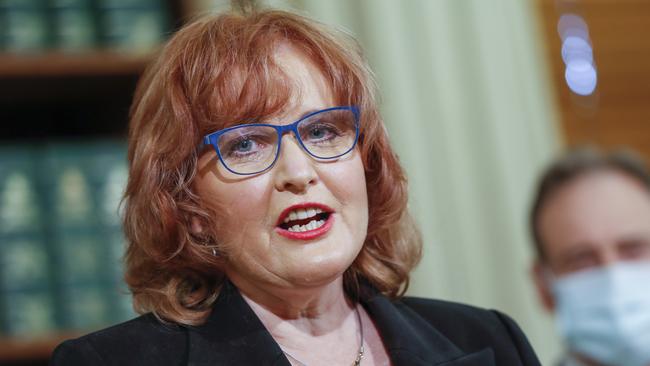‘Great resignation’ of general practitioners raises alarm
A “great resignation” of GPs has raised alarm, as leading doctors reveal what caused the concerning trend.
Victoria
Don't miss out on the headlines from Victoria. Followed categories will be added to My News.
General practitioners fear appointment shortages will worsen as they warn an increasing number of doctors are leaving the profession.
Melbourne GP and former Australian Medical Association president Dr Mukesh Haikerwal said there had been a “great resignation” among GPs in recent months as the pandemic stretches into its third year.
“They just stopped working, because they felt burnt out,” he said.
“We were on the frontline and we didn’t stop working.”
Royal Australian College of General Practitioners president Dr Karen Price said she had also noticed an increase in the number of GPs leaving clinical roles.
“It appears to me to be a lot of women and some of the figures are suggesting that it’s more in the under-35s and over-65s,” she said.
“We need immediate action on this to stop the potential loss of doctors who are already qualified and working.
“Years of underfunding and neglect have put general practice in crisis.”
She said the pandemic had revealed “cracks” in the system and criticised the Medicare rebate — which has not kept up with inflation — and sees GPs earn more per minute for shorter appointments.

“It’s more worthwhile to push patients through than it is to spend time with them, which is scandalous,” she said.
“We’ve got an emerging mental health pandemic, we’ve got aged care, we’ve got longer complex and multiple medical conditions.
“It’s absolute nonsense that we are better renumerated for doing a procedure than we are for counselling a suicidal adolescents.”
Dr Haikerwal said throughout the pandemic, GPs have learnt about changes to Covid-related services they offer – such as vaccine eligibility – when the public does, increasing their workload without warning.
“Our staff were completely wiped,” he said.
“(The government) kept saying go to your GP.
“They made announcements without consulting or working with us.
“If you’re coming towards the end of your career, and you’ve been treated that way, you think ‘why would I bother’.”
He said senior doctors’ early retirement represented more than just a drop in workforce numbers, with younger doctors losing access to mentors with decades of knowledge.
Dr Price warned graduates will burn out if the system prevents them from providing the high-level of care they want to and said this has a flow on effect to hospitals.

“We’ve got this at-risk group of doctors who are providing high-quality care, where the system doesn’t support it.
“I’m really concerned that, sadly, there’ll be a raft of Band-Aid solutions.
“If we lose general practice, we’re going to have enormous ongoing costs into hospital care or fragmented care, which will ultimately cost every single taxpayer more.”
Federal Health Minister Mark Butler said the former Liberal government froze the Medicare rebate for six years, “ripping billions of dollars out of primary care and causing gap fees to skyrocket”.
“No wonder young doctors are walking away from general practice in droves,” he said.
“After nine long years of cuts and neglect of Medicare, it’s never been harder or more expensive to see a doctor than it is now.”
He said the Albanese government was investing almost $1 billion in Medicare and general practice to help address these issues.
“Our Strengthening Medicare Taskforce will identify the best ways to boost affordability, improve access, and deliver better support for patients with ongoing and chronic illness, backed by the $750 million Strengthening Medicare Fund,” he said.
“And after working tirelessly throughout the pandemic we’ll give our doctors the resources to invest in their GP practices with our $220 million Strengthening Medicare GP Grants program.”




